Blockchain is revolutionizing global trade, challenging every rule of commerce. From self-executing smart contracts to transparent supply chains, the impact of blockchain on global trade is undeniable. This technology isn't just a tool, it's a paradigm shift reshaping the world economy and unlocking unprecedented opportunities. Are you ready to explore the transformative impact of blockchain on global trade and discover how your business can harness its power? Join us as we delve into this revolution and uncover the future of commerce.
Table of Contents
Introduction of blockchain technology
Blockchain technology is completely transforming the face of global commerce, ushering in a promising new era. Acting as a distributed and immutable digital ledger, blockchain securely records transactions across a vast network of computers. This unique nature allows for the elimination of traditional intermediaries, streamlining paperwork processes, and minimizing the risk of fraud in trade. Thanks to its transparency, security, and superior efficiency, blockchain is becoming a breakthrough solution for the significant challenges facing international trade, promising a brighter future for global businesses.
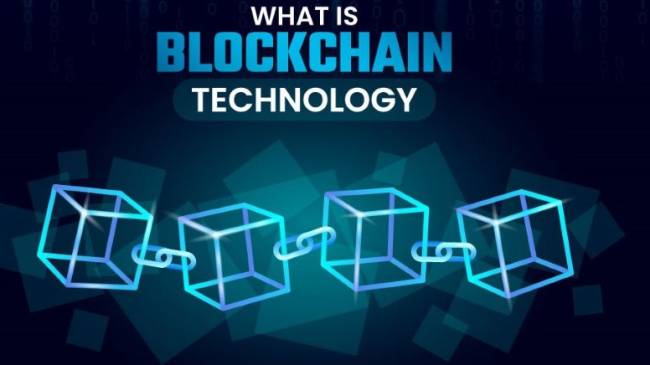
Impact of blockchain on global trade
Streamlining Trade Processes with Blockchain
Smart Contracts: Blockchain's smart contracts are self-executing agreements with predefined rules. They automate contract execution, ensuring transparency and reducing the need for intermediaries. This automation streamlines processes like payment settlements, reducing administrative costs and delays.
Supply Chain Transparency: Blockchain enables transparent and secure tracking of goods across the supply chain. Each transaction and transfer of ownership is recorded on the blockchain, creating an immutable audit trail. This transparency ensures authenticity, reduces the risk of fraud, and enhances overall supply chain efficiency by improving inventory management and logistics.
Trade Finance: Blockchain can revolutionize trade finance by digitizing and automating processes such as letters of credit and invoice financing. By leveraging smart contracts, blockchain facilitates faster transaction settlements and reduces the risk of disputes. This efficiency lowers costs associated with financing and improves liquidity for businesses involved in global trade.
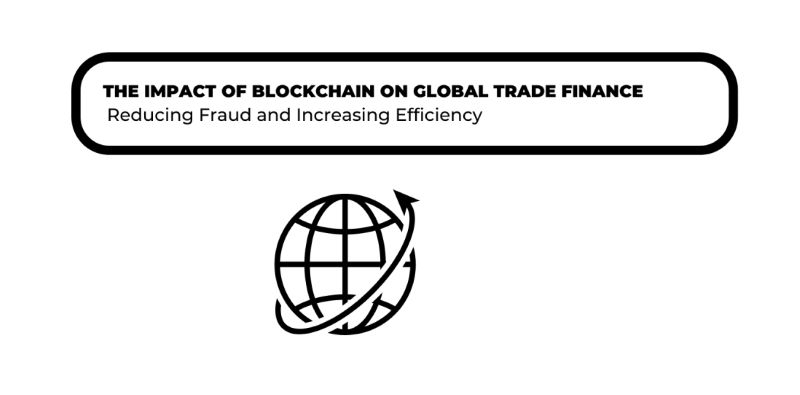
Customs and Border Management: Blockchain enhances customs and border management by providing a secure and transparent record of transactions. Each stage of the trade process, from production to shipment and delivery, is recorded on the blockchain. This tamper-proof record helps customs authorities verify the origin, authenticity, and compliance of goods, facilitating faster clearance and reducing the risk of counterfeit products entering the market.
Enhancing Transparency and Trust in Global Trade
Enhancing transparency and trust in global trade through blockchain technology involves several critical aspects:
Immutable Records: Blockchain's immutability guarantees that once trade data is recorded, it cannot be altered or deleted. This feature creates a transparent and auditable record of transactions, ensuring data integrity and reducing the risk of disputes or fraud.
Provenance Tracking: Blockchain enables the tracking of goods throughout the supply chain, from origin to final destination. This capability allows stakeholders to verify the authenticity of products and ensure ethical sourcing practices, addressing concerns about counterfeit goods and supply chain transparency.
Counterfeit Prevention: By leveraging blockchain, stakeholders can implement secure and transparent mechanisms to verify product authenticity. Immutable records on the blockchain provide a reliable way to authenticate goods, reducing the circulation of counterfeit products in the market.
Building Trust: Blockchain fosters trust among trading partners by providing a shared, tamper-proof source of truth. Transparent and auditable transactions on the blockchain enhance trustworthiness, facilitating smoother transactions and stronger business relationships.
Real-World Applications of Blockchain in Global Trade
IBM Food Trust: IBM Food Trust leverages blockchain technology to enhance food safety and traceability across supply chains. It allows retailers, suppliers, and growers to track food products from farm to shelf, ensuring transparency and reducing the time it takes to trace the origin of contaminated food items.
TradeLens: TradeLens, a collaboration between Maersk and IBM, digitizes global supply chains using blockchain. It provides a secure and transparent platform for all parties involved in international trade, including shippers, freight forwarders, ports, and customs authorities. By digitizing documentation and automating processes, TradeLens aims to reduce paperwork, improve efficiency, and enhance visibility across the supply chain.
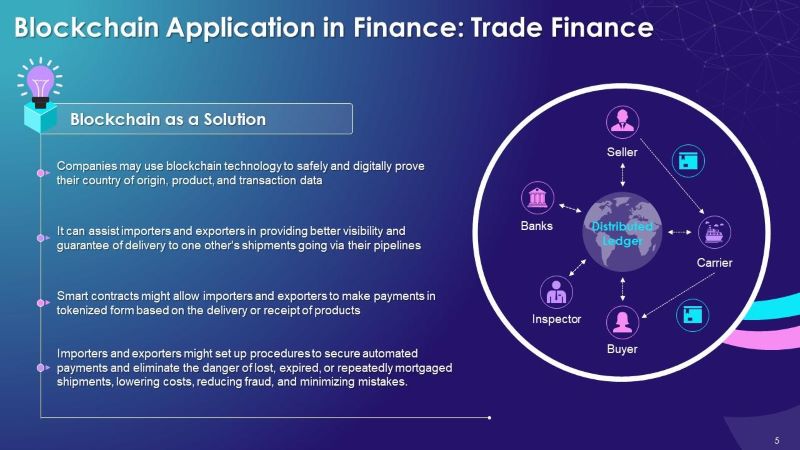
we.trade: we.trade utilizes blockchain technology to simplify trade finance for small and medium-sized enterprises (SMEs). The platform facilitates secure and transparent transactions by automating trade processes, such as verifying the authenticity of trade documents and executing smart contracts. This improves access to finance for SMEs while reducing the administrative burden associated with traditional trade finance methods.
Challenges and Future Outlook in Blockchain for Global Trade
Scalability and Interoperability
One of the primary challenges facing blockchain technology in global trade is scalability. While blockchain offers enhanced security and transparency, its current infrastructure struggles with processing high volumes of transactions quickly and cost-effectively. Scalability issues can hinder the widespread adoption of blockchain across large-scale supply chains and trade networks. Additionally, interoperability between different blockchain networks is crucial for seamless data exchange and transaction settlement. Efforts to develop interoperable protocols and standards will be essential to realizing the full potential of blockchain in global trade.
Regulatory and Legal Frameworks
The adoption of blockchain in global trade also faces regulatory and legal challenges. Governments worldwide are still grappling with how to regulate blockchain technologies, including issues related to data privacy, cross-border transactions, and smart contract enforcement. Clear and consistent regulatory frameworks are necessary to provide businesses and stakeholders with confidence in using blockchain for international trade. Collaborative efforts between industry leaders, policymakers, and regulatory bodies are needed to establish guidelines that ensure compliance without stifling innovation.

Adoption and Education
Despite its potential benefits, widespread adoption of blockchain in global trade requires overcoming barriers related to awareness, understanding, and technical expertise. Many businesses and governments remain unfamiliar with blockchain technology and its applications in supply chain management, trade finance, and customs clearance. Education initiatives are essential to demystify blockchain, showcase successful use cases, and highlight the tangible advantages it offers, such as reduced costs, increased efficiency, and enhanced security. Providing accessible training programs and resources will empower stakeholders to harness blockchain's potential and integrate it into their operations effectively.
The future development trends of Blockchain
The future development trends of Blockchain in global commerce are not limited to improving existing processes but also promise transformative changes.

Decentralized Finance (DeFi) in commerce: DeFi is emerging as an alternative to traditional financial systems, eliminating intermediaries and reducing transaction costs. This facilitates easier access to financial services, especially for small and medium-sized enterprises (SMEs), while opening up opportunities to develop new financial products and services.
Tokenization of commercial assets: The trend of tokenizing real assets such as real estate, commodities, and other financial products into digital tokens on blockchain is gaining popularity. This enhances liquidity, divides assets for broader investor access, and ensures transparency and security in transactions.
Blockchain applications in trade agreements: Blockchain holds significant potential in creating self-executing and transparent trade agreements between nations. Terms are encoded into smart contracts that automatically execute when conditions are met, reducing disputes, enhancing transparency, and optimizing processes.
These trends not only address current challenges in global commerce such as high costs, fraud, and lack of transparency but also create new opportunities for development and innovation. Embracing and leveraging these trends will be key to success for businesses and nations in the digital age.
The impact of blockchain on global trade is undeniable, far exceeding a mere technological trend. It's a powerful force reshaping the entire landscape of commerce, revolutionizing transaction methods and ushering in a new era of transparency, efficiency, and security for international trade.
In the near future, blockchain's impact on global trade will only intensify as it becomes an indispensable foundation for commercial activities worldwide, driving sustainable development and benefiting all participants. This revolution is already underway, and embracing the opportunities presented by blockchain will be crucial for businesses and nations to remain competitive and thrive in this evolving landscape.
Follow U2U Network to update the latest information about Blockchain


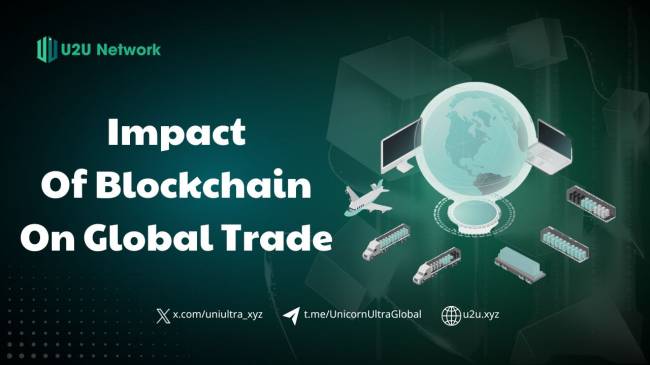
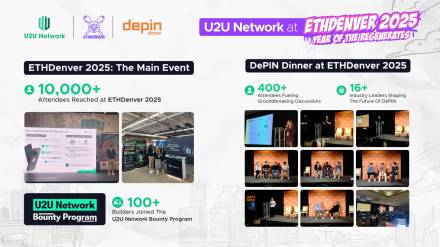

.png)
